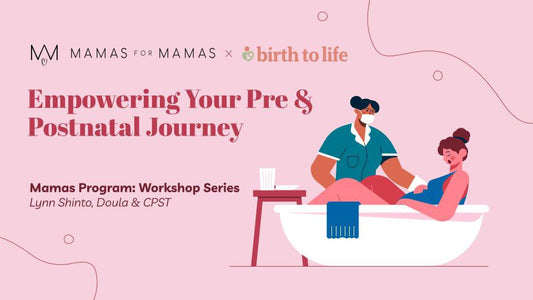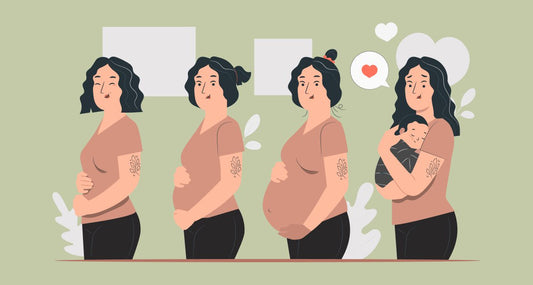Postpartum Partner Support: Essential Tips for New Dads and Co-parents
The wonderful, sometimes chaotic, but always rewarding world of postpartum life—a phase filled with joy, exhaustion, and an overwhelming sense of "Holy moly, it's real now!" This guide is lovingly crafted for new dads and co-parents stepping into this new chapter of life, because let's face it—the postpartum journey secures a VIP pass for more than just mom. From managing postpartum recovery to tackling those unexpected but very relatable mood swings, you're about to become a multi-tasking hero.
Did you know that nearly 10% of fathers experience postpartum depression themselves? Yes, emotions do not discriminate! According to a study from McMaster University, the mental health of new dads can also be shaken during this transition, emphasizing the need for postpartum support tailored to every parent involved. As a hands-on co-parent, your role is crucially significant in nurturing those snuggles and night feeds into shared responsibilities—also known as the greatest team-building exercise of all time.
Our friendly emphasis on postpartum care isn't just a spiel to have your partner's back—think of it as a compass guiding you through diaper storms and colic hurricanes. With big milestones come the smallest of details—like mastering the art of preparing a proper postpartum diet or figuring out how postpartum hormones can transform your sweet partner into Captain Wobble-nerves. Spoiler alert: they might ask for ice cream and pickle sandwiches at 3 AM! The rollercoaster of postpartum essentials awaits with open arms, and we're here to hold your hand every step of the way.
Let’s dive into a lifesaver of tips and tricks—because the phrase "it takes a village" definitely applies here. But first, we'll delve into understanding what the postpartum period truly means for both parents, building your own New Parent Handbook from scratch (sticky notes included).

Understanding Postpartum Changes
Understanding postpartum changes can feel like unlocking Pandora’s box of surprises—and spoiler alert, some surprises may not be as glittering as you'd hope. Post-birth, new moms undergo a cocktail of emotional, physical, and hormonal changes, and let’s just say, their mood swings could give a roller coaster a run for its money! From postpartum depression to the infamous postpartum blues, it's crucial for partners to navigate these murky waters with empathy and understanding.
To start, let’s dive into some physical transformations—think of it as nature's own renovation project. For instance, postpartum bleeding, also known as lochia, might last anywhere from 2 to 6 weeks. During this time, other symptoms like postpartum fatigue and abdominal pain may accompany the often chaotic dance of recovery. The skin can also undergo its own drama with conditions like postpartum stretch marks and hair loss, but not to worry, this is where postpartum skincare heroes like the Aloe Vera Healing Soap come to the rescue!

But wait, there’s more! Hormonal fluctuations can wreak havoc on new moms' mental health. Statistics from the Canadian Mental Health Association indicate that approximately 10-20% of Canadian women experience postpartum depression or anxiety. Recognizing symptoms early is crucial, and this is where partners can really shine by providing unwavering support, whether it’s a listening ear or a heartfelt belly laugh.
Finally, consider the importance of nutritional support during postpartum recovery. Encouraging the new mom to prioritize a balanced diet enriched with essential vitamins can boost recovery and stabilize mood swings. Discussing and adopting activities like gentle postpartum yoga or exercises can also help in restoring core strength, which has likely taken a sabbatical post-birth.
So, dear partners, remember that being supportive doesn’t just mean breakfast in bed (though that's always appreciated!). It’s about being informed, being patient, and when in doubt, diving into resources like our comprehensive Postpartum Recovery Essentials Kit to better navigate this journey alongside your loved one. After all, the post-birth transition is about teamwork—you, the unsung superparent, and the mom who isn’t ready for superhero status just yet!

Emotional Support for the New Mom
Being a partner in the postpartum period can often seem like traversing a new terrain where the roadmap is blurry and the weather forecast is constantly changing! But don’t worry, dads and co-parents—you're not alone. About 23% of first-time dads in Canada experience significant levels of anxiety in the early postpartum period, according to a study by the University of British Columbia, making it crucial to focus on emotional support for the new mom and yourselves. So, how can you best provide that essential emotional support she needs? Here’s the CliffsNotes version!
1. Active Listening
When she says she’s feeling overwhelmed or just unsure, hear her out. This is not a "let’s fix it" scenario, it’s a "let’s feel it" moment. Your role is to be present, validating her feelings without jumping in with solutions faster than you can say "swaddle." Encourage her to express her worries about postpartum recovery, her changing body, or those inevitable baby blues.
2. Regular Check-ins
Gently ask open-ended questions like "How are you feeling today?" rather than the generic "Are you okay?" Trust me, the nuanced difference can open up dialogues about secret worries or triumphs that she might hesitate to share otherwise. Remember, postpartum anxiety or postpartum depression can often go unnoticed, so regular check-ins can provide an emotional lifeline.
3. Encourage Time for Herself
Getting a break from baby duties can be a game-changer. Suggest that she takes a few moments for some self-care practices—whether it's a relaxing shower, a short walk, or just a power nap. The BabyTime Canada Survey reports that 33% of new moms find just 15 minutes of "me time" drastically improves their mental health. Go ahead and play 'Rock, Paper, Scissors' for diaper duty if it means she gets a breather!
4. Affirm Her Struggles and Strengths
Remind her how incredible she is doing—because she truly is! She's nurturing a newborn, after all. Highlight moments when she showed immense strength, whether it was during childbirth or learning to breastfeed at 3 a.m. Be genuine with comments like, "You’re doing such an amazing job with the baby." If you’re looking for ways to verbalize that support, our Postpartum Witch Hazel Perineal Spray can help soothe those physical discomforts, letting her focus on her emotional well-being.
Support is about building each other up during this roller coaster ride called postpartum life. While it’s okay to sometimes feel like a clumsy acrobat attempting a juggling act, always remember—you’re in it together. Providing emotional support can be as simple as just being there to share a laugh, hold a hand, or offer a shoulder to lean on. You've got this!

Practical Support: Sharing Responsibilities
One of the best ways for new dads and co-parents to support their partners postpartum is by diving into the sea of shared responsibilities. Now, I know laundry mountain might not sound like a weekend getaway, but trust me; this kind of vacation pays off in spades! Let's tackle practical support in a way that's simple, effective, and—dare I say—fun?
Divide and Conquer the Chores:
Approach household tasks as a team. According to Statistics Canada, 52% of men now report participating in housework daily, a figure that's been rising steadily over the past few decades. Joining this trend helps lighten the mental and physical load postpartum, reducing stress on the new mom. Take turns with diaper duty or synchronize cooking and cleaning efforts while the baby naps.
Embrace Nighttime Routines:
Navigating night feeds and diaper changes can take on the guise of a clandestine operation. Armed with a ready-to-go baby bottle or a soothing lullaby (even if it's just the first few lines), you can make these overnight missions smoother for your partner. Pro tip: Keep essentials like your favorite Lavender Healing Soap nearby for quick refreshers!
Find Time for Rest and Recovery:
Sleep can't be effectively traded, but it can be scheduled. By taking turns for daytime naps or handling baby duty while your partner catches some Z's, you're investing in the ultimate growth stock: energy and well-being.
"In most families, everyone feels overworked and overwhelmed at times," recommends HelloBC.ca. This rings especially true in the postpartum phase. Remember, sharing responsibilities isn't solely about divvying up tasks; it's about building stronger, resilient partnerships through this exciting—and often exhausting—chapter of life.
For more on postpartum support essentials, check out our Postpartum Recovery Essentials Kit—because every new parent deserves a little extra help along the way!

Encouraging Physical Recovery
Encouraging physical recovery is an integral part of supporting new mothers post-birth, and who better to play a starring role in this than the loving partner? While baby might have you under its adorable spell, remember that your partner, too, needs attention and practical care. Here are some ways to be the superhero they need during this critical phase.
1. Promote Gentle Movement
Gently encouraging your partner to engage in light postpartum exercise, such as walking, can work wonders for their recovery. According to the Canadian Society for Exercise Physiology (CSEP), low-impact activities can help improve mood and reduce the risk of postpartum depression. Plus, who knew the stroll to the park could double as date time?
2. Friendly Food Choices
Nutrition plays a vital role during postpartum recovery. Preparing nutritious meals that are rich in postpartum vitamins like omega-3s and calcium can speed up the healing process, according to Nutrition Canada. Think mood-boosting leafy greens and milk-boosting oats. Bonus: you’ll become a culinary wizard by the time baby hits solids!
3. Take Charge of Practical Needs
From filling those Postpartum Witch Hazel Perineal Spray bottles to keeping the fridge stocked with snacks, small acts can significantly ease the physical burden on a recovering mom. Your magic touch on the everyday tasks can make recovery feel like a breeze.
4. Invest in Postpartum Essentials
Gifting your partner a Postpartum Recovery Essentials Kit can offer comfort and healing. Essentials like a supportive postpartum girdle might not make you leap tall buildings, but they sure help the queen of your home regain her posture and poise.
With these targeted tips, you can provide physical recovery support that truly matters. Remember, your empathy and active involvement may just be the balm she needs. As Dr. Donald Levy from the Canadian Health Society says, "A partner's devotion is the best kind of medicine."

Maintaining a Healthy Relationship
Maintaining a healthy relationship during the postpartum period is like trying to juggle while riding a unicycle—tricky, but definitely possible with the right balance! After the arrival of a newborn, emotions can be as unpredictable as a Vancouver weather forecast. As new dads and co-parents, your role in supporting your partner is crucial, not only for her happiness but for a strong family foundation. Here are some actionable tips to keep the love alive:
1. Communicate Openly and Honestly
While it may sound cliché, open communication is the backbone of any relationship, especially during postpartum recovery. Research suggests that couples who engage in regular sharing and discussion are likelier to report high relationship satisfaction (source). Share your experiences, feelings, and concerns regularly. After all, it's better to talk it out than to play the guessing game of "Why are you mad?"
2. Team Up For Household Duties
Consider postpartum as "team-building camp" for your relationship. Offering to handle diaper duty or cooking a meal doesn’t just lighten the load; it shows your partner that you are in this journey together. Let’s face it, nothing says "I love you" quite like tackling a mountain of dirty laundry!
3. Carve Out Couple Time
Amidst the sleep deprivation and endless baby needs, remember to prioritize couple time. Whether it’s a quick coffee date at home or sharing a laugh over your favorite Netflix series, dedicating time to each other enriches your partnership. Did you know that couples who set aside regular time together report higher levels of happiness?
4. Support Each Other's Individual Needs
Nurturing a healthy bond doesn't mean losing sight of personal well-being. Encourage your partner to indulge in some postpartum self-care with soothing options, or explore activities that restore her mental, physical, and emotional balance. Supporting your partner's "me-time" allows them to be the best version of themselves, benefiting everyone involved.
Remember, this postpartum phase is only temporary, like those sleepless nights and avoiding white clothing due to spills! Relationships, like plants, need nurturing, sunlight, and, yes, even a little weeding sometimes. Your commitment to maintaining a healthy relationship will not only bolster your connection but also create a nurturing environment for your little one to grow. Cheers to more love and less stress!

Seeking Professional Help When Needed
As you journey down the postpartum path with your partner, recognize that seeking professional help is not only okay—it's often essential. It’s like knowing when to call the mechanic before your car breaks down on the highway. In Canada, postpartum depression affects about 23% of new mothers, while an alarming 10% of fathers experience symptoms of anxiety and depression during the postpartum period (source: Public Health Agency of Canada). Yet, many hesitate to seek out professional support.

Here are a few pointers to keep in mind:
- Recognize the Signs: Be alert to any changes in your partner's mood or behavior, such as increased irritability, overwhelming sadness, or anxiety. Emotional upheavals can hit dads and co-parents too, so don't skip your own introspection.
- Explore Available Services: Vancouver and the Lower Mainland are bustling with dedicated professionals ready to support your journey. Clinics offer parenting classes, postpartum therapy, and postpartum doula services to ease both partners into their new roles.
- Engage with Experts: Whether it’s a postpartum doula, lactation consultant, or a therapist, connecting with an expert can address specific concerns, be it postpartum anxiety, lactation issues, or relationship strains.
- Accept Help as a Gift: Remember, embracing assistance doesn’t showcase weakness; it reflects strength and love. As the wise saying goes, "It takes a village to raise a child," and obtaining professional assistance is part of that supportive network.
Embrace the exploration of professional support—it might just be the turning point in your postpartum adventure. So, take a deep breath, maybe sneak in a piece of chocolate (yes, you deserve it), and know that reaching out is a step forward for both you and your partner’s well-being!

Embrace This Period - You’ve Got This
Embarking on the journey of postpartum can be both a daunting and exhilarating experience for new dads and co-parents. Embrace this transformative period with compassion and understanding, as your partner navigates the physical and emotional rollercoaster of newfound parenthood. Your support can be the difference between a turbulent postpartum transition and a smooth one. Remember, open communication is your best friend, much like that late-night cup of coffee to combat postpartum fatigue.
Studies indicate that partners who actively engage in postpartum care can significantly reduce stress levels and bolster mental health for both parents. According to Statistics Canada, nearly 23% of new parents reported experiencing postpartum depression and anxiety within the first year of childbirth. Therefore, taking proactive steps such as participating in postpartum activities or simply providing a listening ear can make a world of difference.
Don't forget, self-care for co-parents is just as critical. After all, you can't pour from an empty cup! Whether it's finding moments for a quick workout, a nourishing snack, or even indulging in some pampering, taking care of your well-being ensures you are present and supportive.
Ultimately, this is a shared journey, marked by the joys, challenges, and everything in between. So, embrace the sleepless nights, the diaper explosions, and yes, the countless baby giggles. After all, as any seasoned parent will tell you, "The days are long, but the years are short". With that, it's time to buckle up and relish every chaotic, love-filled moment of your parenting adventure!
Feel free to explore our Postpartum Recovery Essentials Kit for some added support along the way. Happy parenting!







0 comments